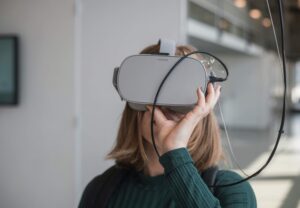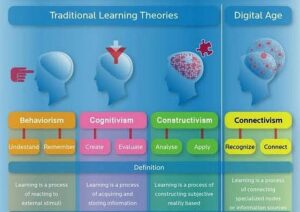Introduction:
The field of education has been profoundly impacted by the rapid pace of technological progress, revolutionizing the methods of instruction and acquisition of knowledge. Amidst the rapid advancement of technology, it is essential to contemplate the profound wisdom imparted by intellectuals such as Thoreau, Goethe, Socrates, Rabbi Hillel, and others. Their timeless advice serves as a compass in navigating the complex landscape of educational technology. Upon introspection of my personal encounters with educational technology, it becomes evident that it encompasses more than mere devices in the classroom. It constitutes a dynamic blend of tools, tactics, and ideologies that collaborate harmoniously to enhance the educational voyage for both teachers and students. The world of education has never been the same since I can remember. It possesses a transformative potential that extends beyond traditional classrooms, reshaping the entire horizon of education. In this blog post, I aim to share my educational journey with a focus on the technological aspect.

Contemporary Definition of Educational Technology:
Amidst the current age of educational technology, it is crucial to move beyond the fascination with devices and platforms and instead strive for a more profound comprehension of its modern interpretation. Educational technology encompasses more than a mere assortment of tools. It involves a dynamic interaction of tactics, ideologies, and digital resources with the goal of enhancing the educational experience. It encompasses both traditional classroom settings and incorporates online and mixed learning methods to accommodate various learning styles and preferences. It is liberating itself from the limitations of conventional classrooms, expanding into digital environments, and accommodating the various ways in which students assimilate knowledge.
Shaping Perspectives through Historical and Philosophical Contexts:
My comprehension and application of educational technology have been influenced by the diverse range of historical and philosophical backgrounds, both knowingly and unknowingly. The profound teachings of Thoreau, Socrates, and other great thinkers serve as a powerful reminder that technology should be regarded as a tool to achieve a goal, rather than an ultimate objective. Being a member of Generation Z, my technological experience has encompassed several stages of growth, ranging from the use of traditional chalkboards to the adoption of modern smartboards, transitioning from writing with pencils to typing on keyboards, and shifting from reliance on landline telephones to the ubiquitous presence of smartphones.
Throughout history, the advancement of technology, exemplified by inventions like the printing press, telegraph, and alphabet, has had a lasting impact on our cultural environment. Gaining a comprehensive understanding of the compromises and environmental consequences of technology advancements is of utmost importance. For example, although the printing press introduced prose to the Western world, it also rendered poetry as a method of communication that was exclusive to the elite. The rapid advancement of technology in education has left me feeling somewhat belated in my adoption of educational technology. As someone who was accustomed to traditional classroom settings, I found it challenging to navigate this new landscape without a solid foundation, which is now commonplace even in kindergarten classrooms. However, given my situation, I also consider myself fortunate to have had the opportunity to experience both traditional and technology-driven methods of learning. People like me have become more digitally literate in this era. 
From e-learning modules to virtual reality simulations that bring history to life, technological evolution has been a series of steppingstones in my academic journey. Now, with collaborative project platforms, we can efficiently accomplish tasks in a joint manner. The introduction of Learning Management Systems (LMS) has streamlined the grading process, making feedback instantly available.
The historical and philosophical foundations of instructional technology have greatly impacted my design and implementation. The field of learning technologies has seen significant evolution since the early 20th century, beginning with film projectors and progressing through behaviorism, cognitivism, and constructivism. These advancements have greatly influenced the design of learning technologies.
The behaviorist approach, which emphasizes observable behaviors, facilitated the development of programmed instruction and early computer-assisted learning. Cognitivism prioritized the examination of mental processes, which had a significant role in the advancement of intelligent tutoring systems and cognitive tools. The principles of constructivism, which prioritize active learning and the creation of knowledge, have had a significant impact on the development of collaborative online environments and multimedia materials.
The design and functioning of my work are influenced by these historical underpinnings, including aspects of behaviorism, cognitivism, and constructivism. My goal is to enhance the process of acquiring knowledge by offering information, fostering analytical thinking, and assisting in the creation of shared knowledge. My application is in line with the constantly growing principles of technology-enhanced learning, emphasizing the significance of student participation and empowerment.
Conclusion:
In a time where technology is sometimes accepted without scrutiny, it is crucial to pay attention to the wisdom accumulated over time. To fully exploit the potential of technology for the greater good, it is crucial to comprehend the trade-offs, acknowledge the beneficiaries and those who may be disadvantaged, uncover the underlying philosophies, recognize the ecological consequences, and avoid idealizing technology. Let us continue with a vigilant approach, utilizing technology to uphold our cultural principles and ambitions rather than being controlled by its impact. The integration of educational technology has consistently transformed my approach to learning. Currently, I perceive myself as an engaged contributor in a vibrant ecosystem, which presents opportunities for novel prospects. The integration of education and technology presents limitless possibilities for future generations.
Great post. As a fellow Gen Z (younger person haha) I too have had similar experiences. I am also definitely used to the traditional setting, but now in hindsight I assume my version of “traditional” might actually be more advanced that what other people consider traditional.
When you say progressing through behaviourism, cognitivism, and constructivism, do you think that these three ideologies/philosophies are inherently separate? Or do believe that the three of them can/ do live collaboratively in some instances? Specifically, with technology?
Thanks for commenting Gen Z partner, haha, I want to answer your questions as behaviorism, cognitivism, and constructivism are separate educational ideas that frequently coexist and collaborate, especially when technology is involved. Within the digital era, platforms effortlessly include behaviorist concepts such as feedback and rewards, cognitivist aspects through interactive simulations, and constructivist features like collaborative projects. The seamless integration of technology enables these philosophies to harmonize with each other, augmenting the learning experience by accommodating a wide range of tastes and demands. The combination of these methodologies showcases their compatibility and flexibility in modern educational environments.